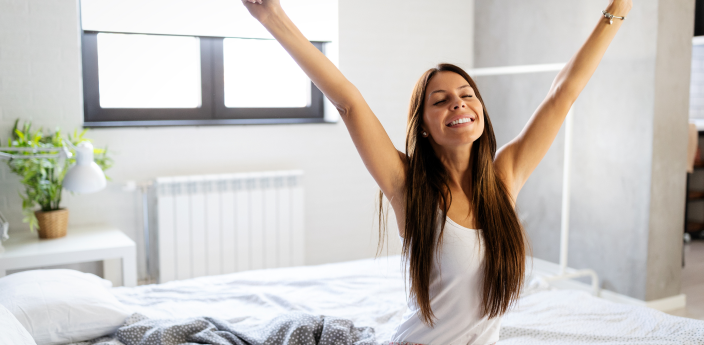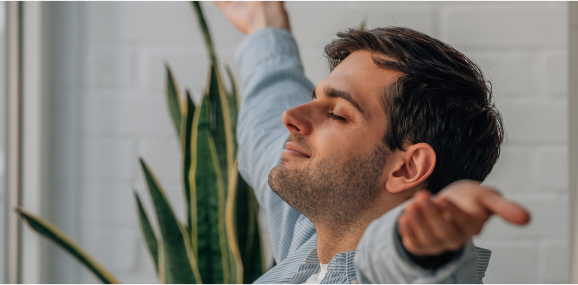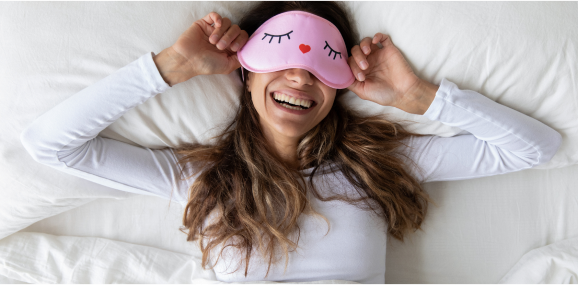Anxiety is the most common mental health condition affecting American adults. It comes on a spectrum and is sometimes tethered to a particular activity. Sleep anxiety, like many other forms of anxiety, can have a detrimental effect on both mental and physical health.
Your body needs sleep, and if anxiety is preventing you from getting an adequate amount of sleep, your mind and body won’t function properly. You should be working with a doctor and a mental health professional if you’re experiencing sleep anxiety.
Changing your sleep habits and using healthy outlets for your anxiety can improve your ability to achieve a sufficient amount of deep sleep.
What Is Sleep Anxiety?
Sleep anxiety is a condition where you feel anxious about going to sleep. Your brain and body will tell you to remain vigilant throughout the night, sacrificing sleep in the belief that it may be unsafe.
This can happen for various reasons. Some people worry that they won’t be safe while they’re asleep. People with a history of nightmares may be apprehensive about falling asleep because they don’t want to have bad dreams. People with health conditions that affect them when they sleep may worry that issues may occur while they’re sleeping.
Many people begin to experience symptoms of sleep anxiety when bedtime approaches. Symptoms are usually more intense when you’re making an attempt to sleep. When you focus on trying to relax, that focus can amplify the anxiety you experience and cause the situation to escalate to an unmanageable point.
Sleep anxiety is different from a phobia of sleep, also called somniphobia. Phobias are separate conditions that require a different approach to treatment.
What Causes Sleep Anxiety?
Anxiety is a normal emotion. Everyone will experience anxiety from time to time. Some people have anxiety specific to situations like with public speaking, taking tests, or performing in a competition. This anxiety isn’t a major disruption to your life if it resolves when the situation at hand resolves. If you get through your speech, sit down, and feel relieved that everything is over, and your normal life resumes.
Sleep anxiety is likely to affect someone every day. Sleep is a necessary part of life, and you need to do it every night. Before bed, when anxious feelings begin to arise, the body releases stress hormones.
Sometimes, these stress hormones produce distressing feelings and setting off alarms in your brain that prevent you from falling asleep entirely. In other cases, they’ll wake you up repeatedly throughout the night and interrupt your sleep.
Who Is Affected By Sleep Anxiety?
Both adults and children can experience sleep anxiety.
Children sometimes experience sleep anxiety because they’re nervous about upcoming events in their lives, or because they don’t understand sleep. If children don’t fully understand what’s happening to their mind and body when they’re asleep and they don’t know that they’re safe, sleep anxiety can keep them up.
In many cases, sleep anxiety affects adults the same way. Adults may have more complex concerns that children, particularly if those concerns draw from past life experiences or traumatic events.
What Are the Symptoms of Sleep Anxiety?
The symptoms of sleep anxiety are usually easy to self assess. If you know what it feels like to be anxious, and you know when you’re trying to go to sleep. If the act of attempting to sleep routinely brings on anxious feelings, you likely have sleep anxiety.
If you don’t have experience with anxiety in other areas of your life, common symptoms of anxiety include feelings of being overwhelmed or a sense that something bad is going to happen, irritability, nervousness, restlessness, or racing thoughts.
Anxiety can also have physical effects, like nausea, heartburn, changes in heart rate, and rapid breathing. Some people sweat or find that their hands get shaky.
What Is the Difference Between Sleep Anxiety and Insomnia?
Although anxiety and insomnia both impact a person's ability to sleep, they do so differently.
In the case of sleep anxiety, someone's feelings are preventing them from being able to go to sleep.
In the case of insomnia, another issue is at hand. Many health conditions, and even the side effects of some medications, can contribute to insomnia. Insomnia is most often the result of the brain’s inability to produce the hormones and chemicals necessary to help the body reach a sleep state. Your brain uses melatonin and GABA to help induce sleep, and if you aren’t producing enough, this can make it difficult for your body to power down at the end of the day.
People with insomnia often desperately crave sleep. They’d really love to be able to close their eyes and doze off for eight hours. They don’t have any reservations about sleeping or any nervousness about what may happen if they do.
Sleep anxiety is a mental health condition that’s triggered by the idea of sleeping or the act of attempting to sleep. People with sleep anxiety are the opposite of people with insomnia. Sleep anxiety compels you to fight the sleep process, even if your body is begging to sleep.
Some mental health conditions can also contribute to sleep anxiety, particularly if you have anxiety in other areas of your life. Some people may experience sleep anxiety exclusively, without ever feeling anxious throughout their day-to-day lives.
How Is Sleep Anxiety Diagnosed?
Although self assessment is an effective way to determine if you should speak to your doctor about potential sleep anxiety, it cannot be independently diagnosed. Heart conditions and respiratory conditions can mimic the symptoms of sleep anxiety, and a thorough examination is necessary to assure that anxiety is the actual issue.
Your doctor will ask you questions about your habits, diet, and lifestyle. If you consume caffeine near bedtime, what feels like sleep anxiety may actually be caffeine sensitivity or overload. This would be good news, because the solution is as simple as eliminating caffeine from your diet.
Your doctor may also ask you about what you do before bed. If you watch crime, horror, mystery, or thriller content, it’s possible that your anxiety response is a result of your pre-bed routine. This is also simple to fix.
If a straightforward cause for your anxiety cannot be uncovered and remedied, your doctor may want to perform further tests. Sleep studies are designed to measure and evaluate what happens to your body as you try to go to sleep, fall asleep, and wake up. These tests measure your heart rate, respiration, eye movement, body movement, and even the electrical activity in your brain.
Sleep studies aren’t always necessary to diagnose sleep anxiety, but in cases where another condition may be contributing to the symptoms, they allow your doctor to construct an accurate and comprehensive portrait of your health to treat you appropriately.
Working with a Mental Health Professional for Sleep Anxiety
Anxiety is typically handled by mental health professionals, rather than conventional medical doctors. Although anxiety has many physical effects, it originates within the brain. Mental health professionals can work with you to uncover the cause of your sleep anxiety and make positive changes that will help to prevent anxious thought patterns or anxious aversions to activities like sleep.
Behavioral Therapies
Behavioral therapies like cognitive behavioral therapy works to change the way you think. Most cognitive-behavioral therapy is talk-based, but your therapist may provide you with workbooks or special homework assignments to help you acclimate to a new way of thinking and practice the skills you’ve learned.
Cognitive-behavioral therapy (CBT) teaches you to understand how your actions, habits, and patterns may be contributing to your anxiety. You’ll be able to better identify, understand, and eliminate things that trigger an anxiety response in your life.
If you have negative associations with sleeping, your bed, or your bedroom, CBT can give you new perspectives that make bedtime feel less intimidating. Combined with a greater understanding of the importance of healthy sleep, you’ll recognize when counterproductive habits or behaviors are beginning to creep in and feel motivated to make changes.
CBT doesn’t work overnight. You’ll need to stick with it for several weeks before you notice a meaningful change. As long as you’re consistent and following your therapist’s instructions, you’ll notice that nighttime anxiety may gradually subside.
Medications
In some cases, medications can be used to manage anxiety levels at nighttime. These medications aren’t intended to be used long term, as many of them have addictive potential.
Your mental health professional may prescribe a temporary short course of these medications to help you get better sleep while you’re learning to make the most of cognitive behavioral therapy.
Before beginning medication, make sure you understand the side effects and risks. If you don’t like the way it makes you feel or if it isn’t working for you, contact your mental health professional. They’ll advise you if you should stop taking the medication or continue it until your next appointment when a more suitable alternative can be implemented.
How To Prevent Sleep Anxiety
In addition to following the professional guidance you’ve received, you may be able to incorporate some lifestyle changes and better practices that will help to prevent sleep anxiety. Speak with your therapist about these changes before you implement them.
Avoid Caffeine
The jittery, racing feeling that people sometimes experience as a result of caffeine consumption isn’t anxiety, but it often feels similar. This feeling might even induce anxiety if you’re uncomfortable with the way caffeine impacts your body. Eliminate or strictly limit caffeine if you’re sensitive to it.
Most people find that stopping all caffeinated beverages by noon gives their body enough time to settle down for bed.
If you aren’t particularly caffeine sensitive, it may be wise to avoid an after dinner cup of coffee. Tea is a soothing nighttime beverage, but many varieties of tea contain caffeine. Switch to an herbal chamomile soothing nighttime blend to satisfy your tea craving without ramping up your energy levels at bedtime.
Make Bedtime a Happy Time
Avoid things that might stress you out around bedtime. Don’t stream anything that may be upsetting or scary. Stay off your phone for a few hours. Stick to activities that you know will keep you calm and happy. Journaling, crafts, or other hobbies that you find fulfilling are a great way to fill the hours between washing the dinner dishes and tucking yourself in.
Ideally, you should reach a place in your mind that’s free from the burden of stress or worry. If you lay down in a calm mood, you’re more likely to remain in a calm mood until you fall asleep. If you’re feeling a little tense, don’t go to bed right away. Find a comfortable chair to meditate in or participate in a soothing activity that doesn’t occupy too much brain power, like an adult coloring book.
Only allow yourself to get into bed once your mood and emotional state feels stable and manageable.
Changing the Way You Sleep
Many people who feel restless at night have a positive response to deep touch therapy. Deep touch therapy is, at its core, feels like a calming hug. When gentle compression is applied all over the body, people feel more calm and secure.
The Hug Sleep Pod is designed to mimic the effects of deep touch therapy. You snuggle into the lightweight, breathable, stretchy sleep pod. As you settle in, the pod begins to apply gentle compression to your entire body. It’s your own little loving embrace that holds you all throughout the night.
Create a Routine That Makes You Feel Secure
Many people who live with anxiety feel that routines help them manage their emotional distress. If you can make a checklist of the things you need to do to feel safe and follow that checklist every night, you won’t be worried when you lay down. You won’t feel the need to get up and check to make sure the alarm is set or the doors are locked if you do a round to check before you go to bed.
If the noises in your house or around your neighborhood are unsettling or startling to you, a white noise machine, a box fan, or ambient sleep music can help to drown unsettling noises out. You’ll be able to focus on soothing sounds, rather than reacting to every noise you can hear through the quiet.
Many people with anxiety find that aromatherapy can be a useful tool. An aromatherapy diffuser on your nightstand will provoke a response from your olfactory system, which is the system that processes scents. Your olfactory system will stimulate your limbic system, the system that regulates your emotions. Good smells make you feel good.
By diverting your attention to the pleasant aroma and taking deep, calming breaths to enjoy it fully, you’re less focused on getting lost in your own thoughts. You’re occupying your brain with something simple that feels good.
Conclusion
Sleep anxiety is a real mental health condition that requires the intervention of a medical health professional to treat. Thanks to tools like telemed health apps, it’s easier (and less expensive) to get mental health assistance when you need it.
There are some things you can do at home to help you cope, too. Developing better bedtime habits and making sure you’re comfy at night may help to keep you at ease when it’s time to doze off.
Looking for more on mental health and sleep? Explore our blog here.
Sources
Facts & Statistics | Anxiety and Depression Association of America
GABA release in the locus coeruleus as a function of sleep/wake state | PubMed
Aromatherapy: Do Essential Oils Really Work? | Johns Hopkins Medicine

































500,000+ happy customers